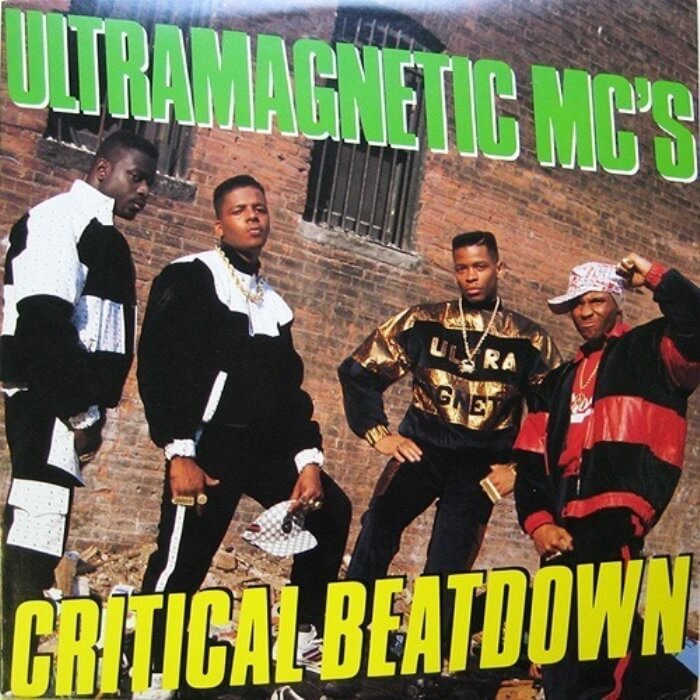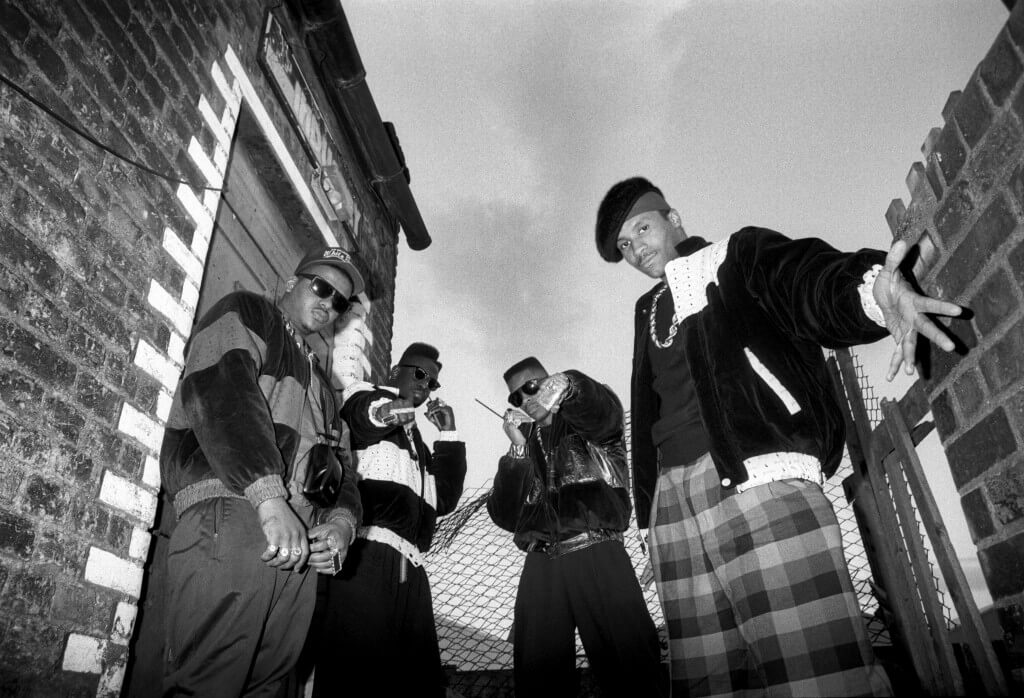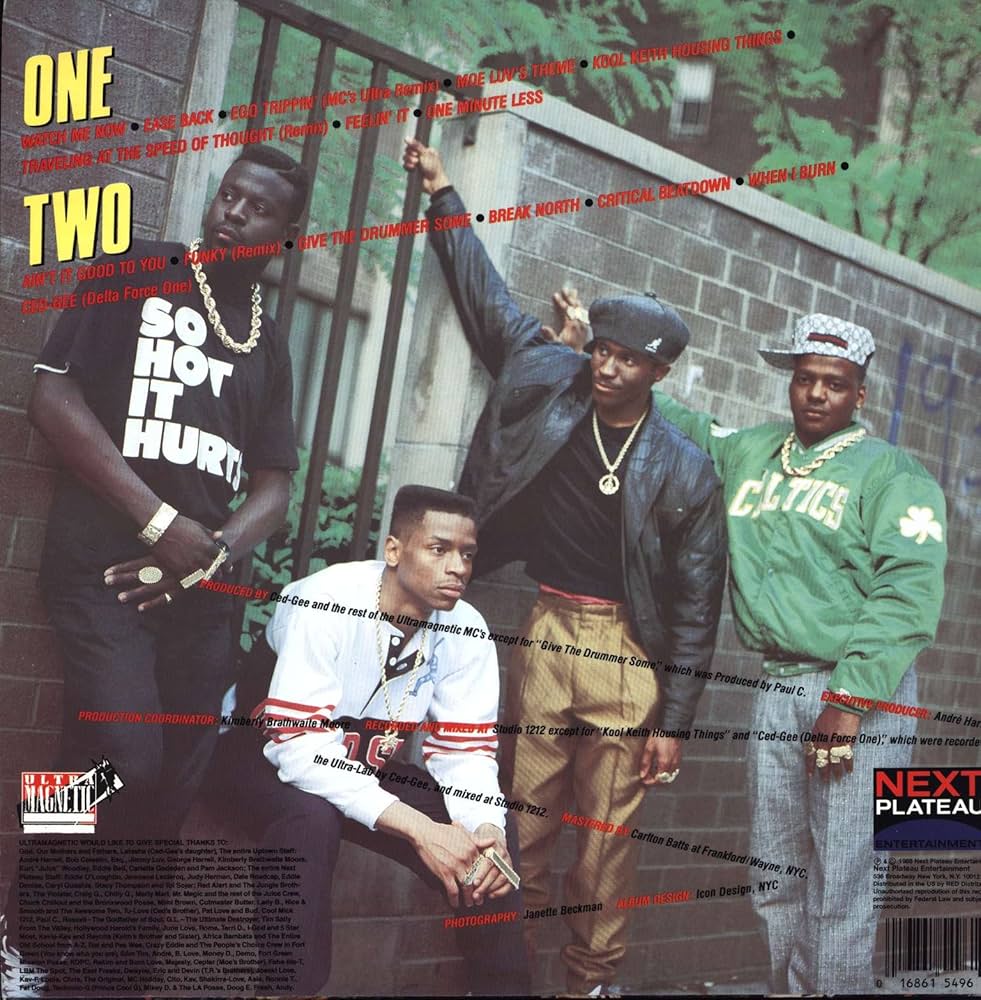
Released in 1988, Critical Beatdown by Ultramagnetic MCs is a pioneering album in Hip Hop history, revered for its innovation in both production and lyrical delivery. Comprised of Kool Keith, Ced Gee, TR Love, and DJ Moe Love, Ultramagnetic MCs brought a futuristic, boundary-pushing approach to their music. Their debut album is packed with dense, off-kilter rhymes and gritty beats that were ahead of their time and foundational for the direction Hip Hop would take in the years to come.
At the heart of Critical Beatdown is its production, much of which was handled by Ced Gee. What immediately strikes the listener is the raw, gritty sound that underpins the album. Using the E-mu SP-1200 sampler, Ced Gee pulled samples from a variety of genres, chopping and reconfiguring them in ways that sounded completely fresh. The heavy use of James Brown drum breaks, combined with unconventional sample choices, gave the album a frenetic energy. Tracks like “Watch Me Now” and “Give the Drummer Some” are prime examples of how Ultramagnetic MCs were not afraid to experiment with sounds, moving away from the more straightforward beats that dominated Hip Hop at the time.
Ced Gee’s approach to sampling was revolutionary. While many producers in the late 1980s were looping funk and soul breaks, Ced Gee took a more abstract route, slicing up drum patterns and layering them with dissonant sounds and obscure samples. This created a chaotic yet controlled sound that was different from anything else in Hip Hop at the time. The roughness of the production gave the album an edge, making it feel like a raw, unpolished gem.
The title track “Critical Beatdown” exemplifies the kind of forward-thinking production that defines the album. With its rapid-fire drums and hard-hitting bassline, the track encapsulates the aggressive energy of the album. The beats are relentless, with no sign of easing up, mirroring the album’s overall aesthetic of intense, unfiltered expression. It’s clear that Ultramagnetic MCs weren’t interested in conforming to any mainstream sounds, but rather in carving out their own unique sonic landscape.
If the production on Critical Beatdown is forward-thinking, the lyrical content is even more so. Kool Keith and Ced Gee brought a new level of complexity to their verses. Kool Keith’s off-the-wall, stream-of-consciousness style defied traditional rhyme schemes. His lines were filled with scientific and abstract references, blending surrealism with braggadocio in a way that had never been heard before in Hip Hop.
On tracks like “Ego Trippin’,” Kool Keith’s lyrics dart between topics, offering a dizzying array of wordplay and bizarre imagery. His delivery is non-linear, bouncing between subjects while maintaining a cohesive energy that keeps the listener engaged. His unpredictability became one of his trademarks, making him one of the most unique voices in Hip Hop. Keith’s willingness to experiment with unconventional flows and lyrical themes helped establish a style that was not easily imitated but would influence future generations of artists.
Ced Gee, while less eccentric than Kool Keith, brought a more grounded and technically precise style to the group. His verses often delved into the technical aspects of rap, displaying a mastery of intricate rhyme schemes and internal rhymes. On tracks like “Feelin’ It,” Ced Gee’s flow is both controlled and explosive, delivering hard-hitting bars with precision. Together, Kool Keith and Ced Gee created a dynamic that balanced the album, with Keith providing the wild, unrestrained energy, and Ced offering a more calculated approach.
Critical Beatdown was groundbreaking. Its influence can be heard in the work of countless artists who came after, particularly those who pushed the envelope in terms of production and lyrical content. The album’s innovative approach to beat-making laid the groundwork for producers like RZA and Madlib, who would similarly explore unconventional sample manipulation and rugged, lo-fi sounds in their music.
Lyrically, Kool Keith’s style would inspire a generation of MCs, particularly in the alternative and underground scenes. His abstract, almost stream-of-consciousness delivery paved the way for artists like MF DOOM, Del the Funky Homosapien, and even modern acts like Earl Sweatshirt. The willingness to diverge from the norms of storytelling in rap, to embrace surrealism and abstract lyricism, was something that Critical Beatdown introduced to Hip Hop culture in a major way.
Moreover, the album’s unapologetic rawness and rebellious attitude helped carve out a lane for artists who didn’t fit the mold of mainstream Hip Hop. While Public Enemy was using their music to deliver pointed political messages and N.W.A was exposing the harsh realities of street life, Ultramagnetic MCs were focused on lyrical dexterity, sci-fi imagery, and creating an avant-garde sound that was far removed from anything that had come before it.
“Ego Trippin’” is one of the standout tracks, a seminal song in Hip Hop history. The song is driven by a pulsating bassline and stuttering drums, with Kool Keith delivering one of his most iconic verses. The track is also significant for its early use of sampling, with Ced Gee flipping multiple James Brown breaks into something unique. “Give the Drummer Some” is another high-energy track that demonstrates the group’s love for rhythm and breakbeats. With its heavy emphasis on drums and sparse instrumentation, the track allows the vocals to take center stage. Kool Keith’s verses on this track are some of his most energetic, as he effortlessly bounces across the beat with wild abandon. The title track, “Critical Beatdown,” is a furious anthem that captures the aggressive tone of the album. The rapid pace of the track, coupled with its relentless drum patterns, makes it a perfect showcase for the group’s lyrical athleticism. Kool Keith’s off-kilter flow and Ced Gee’s punchy delivery collide to create a sonic explosion.
While Critical Beatdown may not have achieved massive commercial success at the time of its release, over the years it has been recognized as a classic, with its unconventional approach to both production and lyricism paving the way for the alternative Hip Hop movement of the 1990s and 2000s. It helped embrace an experimental ethos that would inspire generations of underground artists.
The album’s avant-garde style and forward-thinking production techniques have kept it in the conversation about the most innovative and impactful Hip Hop records of all time. Even decades later, its raw energy, complex lyrics, and groundbreaking beats continue to captivate. For those seeking to understand the roots of experimental and alternative Hip Hop, Critical Beatdown is a must-listen album that remains as essential now as it was in 1988.

